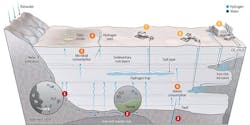NREL Selected to Study Geological Hydrogen as Potential Solution for Decarbonizing Energy-Intensive Industries
The National Renewable Energy Laboratory (NREL) has been selected as one of 16 teams to research the enhanced production of geologic hydrogen by the U.S. Department of Energy (DOE) Advanced Research Projects Agency-Energy (ARPA-E) program, a $1.6 million federal funding effort to evaluate ways to stimulate hydrogen production from geologic resources.
The project, led by Texas Tech University with partners from NREL, Lawrence Berkeley National Laboratory, Rio Tinto, and Lavoisier H2 Geoconsult, aims to stimulate hydrogen production from iron-rich mafic and ultramafic rocks through chemical, mechanical, and biological processes.
While geological hydrogen is currently poorly understood, it has the potential to be a crucial energy resource that relies on certain types of rocks and subsurface environments that produce natural hydrogen. Clean hydrogen, including naturally occurring subsurface hydrogen, can reduce harmful emissions from energy-intensive sectors, such as chemical and industrial processes and heavy-duty transportation.
"Natural hydrogen production is important because current methods for producing hydrogen are energy intensive, with hydrogen needing to be derived from other sources, like water or methane," said NREL Research Scientist Dayo Akindipe. "This new process intends to accelerate the production of natural hydrogen by applying multiple stimulation methods to produce hydrogen that can be used for transportation, chemical and industrial processes, and other applications.”
NREL, led by Akindipe, will support the new project by implementing a microcosm experiment to characterize the rock, water, and hydrogen systems. NREL researchers Katherine Chou and Jianping Yu will find ways to inhibit the microbial uptake of the produced hydrogen and monitor the role of biocatalysts to help increase the rate of hydrogen production.
Moreover, NREL's team will assist in developing tech-to-market efforts once the geologic hydrogen system is established as viable.
"This project is going to tell us a couple of things," Akindipe said. "Firstly, is geologic hydrogen production possible at scale? Secondly, will it be feasible economically and in terms of life cycle emissions? These are the questions this project will answer."
The funding is part of ARPA-E's Exploratory Topics related to geologic hydrogen, which aim to explore early-stage research and development to advance low-cost, low-emission hydrogen. The energy resource is anticipated to cut carbon emissions and support efforts to reduce costs and enable commercial-scale deployment of clean hydrogen. This will help create jobs and economic opportunities in communities across the nation to meet climate and decarbonization goals.
About the Author
EnergyTech Staff
Rod Walton is head of content for EnergyTech.com. He has spent 17 years covering the energy industry as a newspaper and trade journalist.
Walton formerly was energy writer and business editor at the Tulsa World. Later, he spent six years covering the electricity power sector for Pennwell and Clarion Events. He joined Endeavor and EnergyTech in November 2021.
He can be reached at [email protected].
EnergyTech is focused on the mission critical and large-scale energy users and their sustainability and resiliency goals. These include the commercial and industrial sectors, as well as the military, universities, data centers and microgrids.
Many large-scale energy users such as Fortune 500 companies, and mission-critical users such as military bases, universities, healthcare facilities, public safety and data centers, shifting their energy priorities to reach net-zero carbon goals within the coming decades. These include plans for renewable energy power purchase agreements, but also on-site resiliency projects such as microgrids, combined heat and power, rooftop solar, energy storage, digitalization and building efficiency upgrades.
